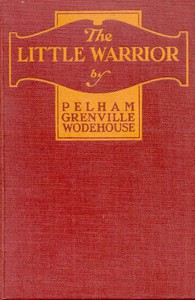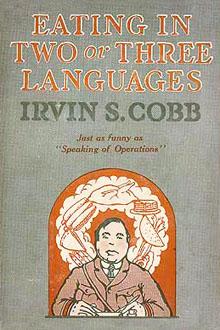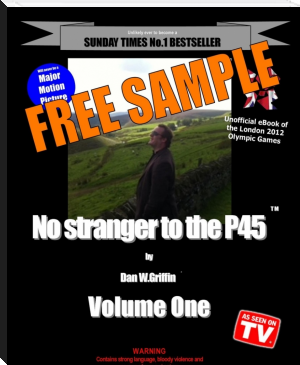The Little Warrior by P. G. Wodehouse (top 50 books to read txt) 📗

- Author: P. G. Wodehouse
Book online «The Little Warrior by P. G. Wodehouse (top 50 books to read txt) 📗». Author P. G. Wodehouse
“Woof-woof-woof!” said Bill the parrot.
No dispassionate auditor could have failed to detect the nasty ring of sarcasm. It stung Henry. He was not normally a man who believed in violence to the gentler sex outside a clump on the head of his missus when the occasion seemed to demand it: but now he threw away the guiding principles of a lifetime and turned on Jill like a tiger.
“Gimme that stick!”
“Get back!”
“Here, I say, you know!” said Freddie.
Henry, now thoroughly overwrought, made a rush at Jill: and Jill, who had a straight eye, hit him accurately on the side of the head.
“Goo!” said Henry, and sat down.
And then, from behind Jill, a voice spoke.
“What’s all this?”
A stout policeman had manifested himself from empty space.
“This won’t do!” said the policeman.
Erb, who had been a silent spectator of the fray, burst into speech. “She ’it ’im!”
The policeman looked at Jill. He was an officer of many years’ experience in the Force, and time had dulled in him that respect for good clothes which he had brought with him from Little-Sudbury-in-the-Wold in the days of his novitiate. Jill was well-dressed, but, in the stirring epoch of the Suffrage disturbances, the policeman had been kicked on the shins and even bitten by ladies of an equally elegant exterior. Hearts, the policeman knew, just as pure and fair may beat in Belgrave Square as in the lowlier air of Seven Dials, but you have to pinch them just the same when they disturb the peace. His gaze, as it fell upon Jill, red-handed as it were with the stick still in her grasp, was stern.
“Your name, please, and address, miss?” he said.
A girl in blue with a big hat had come up, and was standing staring open-mouthed at the group. At the sight of her Bill the parrot uttered a shriek of welcome. Nelly Bryant had returned, and everything would now be all right again.
“Mariner,” said Jill, pale and bright-eyed. “I live at Number Twenty-two, Ovington Square.”
“And yours, sir?”
“Mine? Oh, ah, yes. I see what you mean. Rooke, you know. F. L. Rooke. I live at the Albany and all that sort of thing.”
The policeman made an entry in his note-book. “Officer,” cried Jill, “this man was trying to kill that parrot and I stopped him. …”
“Can’t help that, miss. You ’adn’t no right to hit a man with a stick. You’ll ’ave to come along.”
“But, I say, you know!” Freddie was appalled. This sort of thing had happened to him before, but only on Boat-Race Night at the Empire, where it was expected of a chappie. “I mean to say!”
“And you too, sir. You’re both in it.”
“But …”
“Oh, come along, Freddie,” said Jill quietly. “It’s perfectly absurd, but it’s no use making a fuss.”
“That,” said the policeman cordially, “is the right spirit!”.
§ 3.Lady Underhill paused for breath. She had been talking long and vehemently. She and Derek were sitting in Freddie Rooke’s apartment at the Albany, and the subject of her monologue was Jill. Derek had been expecting the attack, and had wondered why it had not come before. All through supper on the previous night, even after the discovery that Jill was supping at a near-by table with a man who was a stranger to her son, Lady Underhill had preserved a grim reticence with regard to her future daughter-in-law. But today she had spoken her mind with all the energy which comes of suppression. She had relieved herself with a flow of words of all the pent-up hostility that had been growing within her since that first meeting in this same room. She had talked rapidly, for she was talking against time. The Town Council of the principal city in Derek’s constituency in the north of England had decided that tomorrow morning should witness the laying of the foundation stone of their new Town Hall, and Derek as the sitting member was to preside at the celebration. Already Parker had been dispatched to telephone for a cab to take him to the station, and at any moment their conversation might be interrupted. So Lady Underhill made the most of what little time she had.
Derek had listened gloomily, scarcely rousing himself to reply. His mother would have been gratified, could she have known how powerfully her arguments were working on him. That little imp of doubt which had vexed him in the cab as he drove home from Ovington Square had not died in the night. It had grown and waxed more formidable. And, now, aided by this ally from without, it had become a colossus, straddling his soul. Derek looked frequently at the clock, and cursed the unknown cabman whose delay was prolonging the scene. Something told him that only flight could serve him now. He never had been able to withstand his mother in one of her militant moods. She seemed to numb his faculties. Other members of his family had also noted this quality in Lady Underhill, and had commented on it bitterly in the smoking-rooms of distant country-houses at the hour when men meet to drink the final whisky-and-soda and unburden their souls.
Lady Underhill, having said all she had to say, recovered her breath and began to say it again. Frequent iteration was one of her strongest weapons. As her brother Edwin, who was fond of homely imagery, had often observed, she could talk the hind-leg off a donkey.
“You must be mad, Derek, to dream of handicapping yourself at this vital stage of your career with a wife who not only will not be a help to you, but must actually be a ruinous handicap. I am not blaming you for imagining yourself in love in the first place, though I really should have thought that a man of your strength and character would … However, as I say, I am not blaming you for that. Superficially, no doubt, this girl might be called attractive. I do not admire the type myself, but I suppose she has that quality—in my time we should have called it boldness—which seems to appeal to the young men of today. I could imagine her fascinating a weak-minded imbecile like your friend Mr Rooke. But that you … Still, there is no need to go into that. What I am trying to point out is that in your position, with a career like yours in front of you,—it’s quite certain that in a year or two you will be offered some really big and responsible position—you would be insane to tie yourself to a girl who seems to have been allowed to run perfectly wild, whose uncle is a swindler …”
“She can’t be blamed for her uncle.”
“… Who sups alone with strange men in public restaurants. …”
“I explained that.”
“You may have explained it. You certainly did not excuse it or make it a whit less outrageous. You cannot pretend that you really imagine that an engaged girl is behaving with perfect correctness when she allows a man she has only just met to take her to supper at the Savoy, even if she did know him slightly years and years ago. It is very idyllic to suppose that a childhood acquaintance excuses every breach of decorum, but I was brought up to believe otherwise. I don’t wish to be vulgar, but what it amounts to is that this girl was having supper—supper! In my days girls were in bed at supper-time!—with a strange man who picked her up at a theatre!”
Derek shifted uneasily. There was a part of his mind which called upon him to rise up and challenge the outrageous phrase and demand that it be taken back. But he remained silent. The imp-colossus was too strong for him. She is quite right, said the imp. That is an unpleasant but accurate description of what happened. He looked at the clock again, and wished for the hundredth time that the cab would come. Jill’s photograph smiled at him from beside the clock. He looked away, for, when he found his eyes upon it, he had an odd sensation of baseness, as if he were playing some one false who loved and trusted him.
“If you were an ordinary man like hundreds of the idle young men one meets in London, I would have nothing to say. I dislike the girl intensely, but I would not interfere in what would be your own private business. No doubt there are plenty of sets in society where it matters very little what sort of a woman a man marries. But if you have a career, especially in politics, you know as well as I do that a suitable wife means everything. You are a public figure even now. In a few years you will be a very big public figure. That means that your wife will have every eye upon her. And what will she be? A minx!” said Lady Underhill viciously.
Once more Derek stirred uneasily, and once more he remained silent. A gleam came into Lady Underhill’s black eyes. All her life she had been a fighter, and experience had taught her to perceive when she was winning. She blessed the dilatory cabman.
“Well, I am not going to say any more,” she said, getting up and buttoning her glove. “I will leave you to think it over. All I will say is that, though I only met her yesterday, I can assure you that I am quite confident that this girl is just the sort of harum-scarum, so-called ‘modern’ girl who is sure some day to involve herself in a really serious scandal. I don’t want her to be in a position to drag you into it as well. Yes, Parker, what is it? Is Sir Derek’s cab here?”
The lantern-jawed Parker had entered softly, and was standing deferentially in the doorway. There was no emotion on his face beyond the vague sadness which a sense of what was correct made him always wear like a sort of mask when in the presence of those of superior station.
“The cab will be at the door very shortly, m’lady. If you please, Sir Derek, a policeman has come with a message.”
“A policeman?”
“With a message from Mr Rooke.”
“What do you mean?”
“I have had a few words of conversation with the constable, sir,” said Parker sadly, “and I understand from him that Mr Rooke and Miss Mariner have been arrested.”
“Arrested! What are you talking about?”
“Mr Rooke desired the officer to ask you to be good enough to step round and bail them out!”
The gleam in Lady Underhill’s eye became a flame, but she controlled her voice.
“Why were Miss Mariner and Mr Rooke arrested, Parker?”
“As far as I can gather, m’lady, Miss Mariner struck a man in the street with a stick, and they took both her and Rooke to the Chelsea Police Station.”
Lady Underhill glanced at Derek, who was looking into the fire.
“This is a little awkward, Derek,” she said suavely. “If you go to the police-station, you will miss your train.”
“I fancy, m’lady, it would be sufficient if Sir Derek were to dispatch me with a check for ten pounds.”
“Very well. Tell the policeman to wait a moment.”
“Very good, m’lady.”
Derek roused himself with an effort. His face was drawn and gloomy. He sat down at the writing-table, and took out his check-book. There was silence for a moment, broken only by the scratching of the pen. Parker took the check and left the room.
“Now, perhaps,” said Lady Underhill, “you will admit that I was right!” She spoke in almost an awed voice, for this occurrence at just this moment seemed to her very like a direct answer to prayer. “You can’t hesitate now! You must free yourself from this detestable entanglement!”
Derek rose without speaking. He took his coat and hat from where they lay on a chair.
“Derek! You will! Say you will!”
Derek put on his coat.
“Derek!”
“For heaven’s sake, leave me alone, mother. I want to think.”
“Very well. I will leave you to think it over, then.” Lady Underhill moved to the door. At the door she paused for a moment, and seemed about to speak again, but her mouth closed resolutely. She was a shrewd woman, and knew that the art of life is to know when to stop talking. What words have accomplished, too many words can undo.
“Good-bye.”
“Good-bye, mother.”
“I’ll see you when you get back?”
“Yes. No. I don’t know. I’m not certain when I shall return. I may go away for a bit.”
The door closed behind Lady Underhill. Derek sat down again at the writing-table. He wrote a few words on a sheet of paper, then tore it up. His eye travelled to the mantelpiece. Jill’s photograph smiled happily down at





Comments (0)